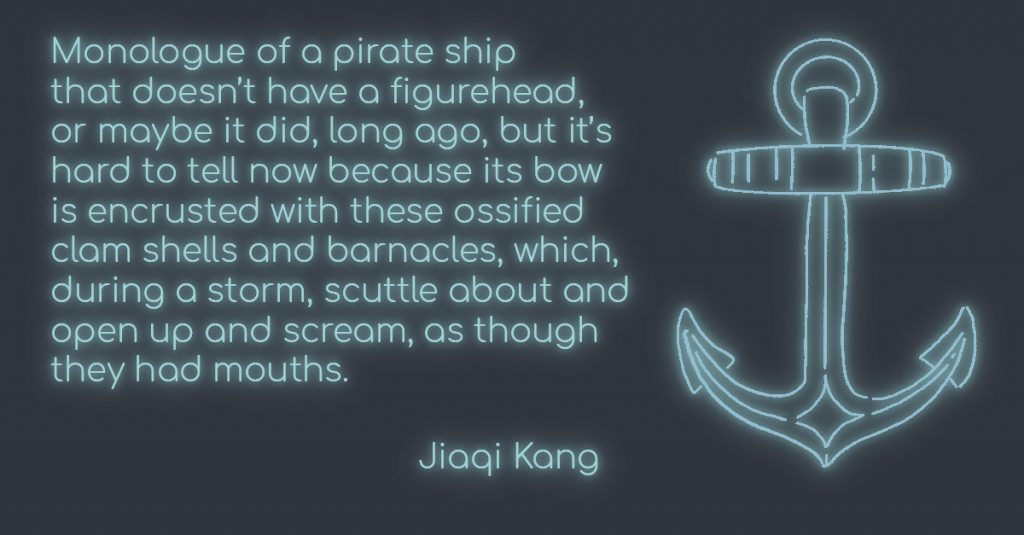I only ever wanted to know how it felt to have the wind beneath your feet, eager to hoist you up to where you needed to be, hands outstretched, palms faced upwards and fingers laced together, inviting. As a sapling I watched children do that, paid special attention to the one at the bottom who was always getting a faceful of leg, ass, and hand as his friends used him to clamber over the wall. I was friends with the wall. My roots were entwined with the bricks at its foundation. We’d come up around the same time, the wall erected where before there was only common. When the time came for me to leave, it was difficult for them to cut me down. Like the wall was holding on to me, trying to keep me there. They had to smash some of the stone to tear me out, and dig their heels into the mud and pull and pull.
Afterwards, they stripped my bark and made me smooth. Made me bend and curve the way they wanted. The wall stayed put and did its job, which was to enclose, and forgot me. Part of me became the holster for a sail, and when the wind blew across the water and filled my puffed-out cheeks I learned that nothing is as good as you think it’ll be when you’re lying on your back on a common that no longer exists while your mother rubs your belly in comforting circles. I learned that you can miss stomachaches, and the sky when it’s placid, and children who snap your branches and tuck their garbage into the crooks of your trunk. I learned that you can be seasick.
The sea was so wide, the first time. The sky was empty. I crossed them and crossed them and didn’t leave so much as a mark. The water held no imprint. It took me years to realise that the waves lapping against me wanted nothing from me, and had nothing to say to me either.
My captain sings to me when he thinks only I can hear. My captain shares his rum with me and sometimes falls out of his bed so I can feel his skin. My captain saw my run-down husk and replaced each and every one of my planks, some himself, some by others under his orders. When I first met my captain he was only a child. He reminded me of myself at that age: supple, wicked, with conniving thoughts. I watched him shed his skirts and cut his hair. I watched him kill his masters with a cleaver he pocketed from the kitchens. I was there when he lost his leg and I gave him a part of me to use as peg, and it was like how he used to run a finger across the coarse grain of my body to see if I’d splinter him; that hiss of pain and prick of blood always such a thrill, as though in that moment he understood me. The splinters always pushed themselves out some days later but when he received the peg, it was mine for him to keep. His.
My name is Shen. It means deep. It means God. It means aunt. It means that I live in the gap beneath your bed and only come out to call you down to mealtimes. No, it doesn’t. My kidnappers only thought it would be an easy name to use for when they needed me to wade into the water on their behalf. Sometimes, I drop my anchor into the sands in the dark and wonder if I’ll fall in love with whatever I find next. There was a particular ripple that passed through me once and made me wonder whether that’s what it feels like, when it happens—as though something has moved through you, has made use of you in that moment as some kind of transit or vessel, and now all you want to do is to follow it wherever it goes so that it may use you again. I think it was made of sound, the ripple, though I don’t know what it sounds like.
Here’s what I do know: I know that aunts are meant to look like dads, all square faces and round eyes, lips clicking around pistachio shells. I know the sound of my captain’s footsteps, the drag of him across the floor. I know that the color purple exists, though I have never seen it. I know that the common is gone. I know that my captain’s parrot did not die of an accident, that the first mate poisoned it, that he will use the same poison to kill my captain. I know that I will not let them throw my captain’s body into the ocean after they kill him. I will not even let them touch his body, which only I have felt, his breasts tucked between his chest and the straw mattress when he sleeps, his scarred and mottled arms, the snail that lives in his hair, he sound of his snoring. I would sooner sink myself and every soul that has carved a space for itself inside my brig than let my captain’s crew dispose of him like some aging widow too old to sweep an alehouse floor.
They think because I am an aged, creaking thing, because I am ugly and damp, that I cannot fight back. What they don’t know is that my captain loves me for what he sees of me. I’d always hoped I’d die by fire, but if I am to drown, for my captain, I’d be glad, I’d be honored, I wouldn’t cry. Let the breeze take the pieces of me to some faraway shore, with enough wood to start anew.

